Ramin Bahrani‘s 18-minute short is brilliant, touching…full of feeling. Note-perfect narration by Werner Herzog.
Daily
ND/NF Soiree
The Museum of Modern Art’s film department hosted Wednesday night’s launch party for New Directors/New Films 2010, although the program is co-sponsored by MOMA and the Film Society of Lincoln Center. The opening-night film was Richard Press‘s Bill Cunningham New York, a likable, open-hearted, intensely New Yorkish documentary about the legendary N.Y.Times fashion photographer (i.e., “On The Street”).
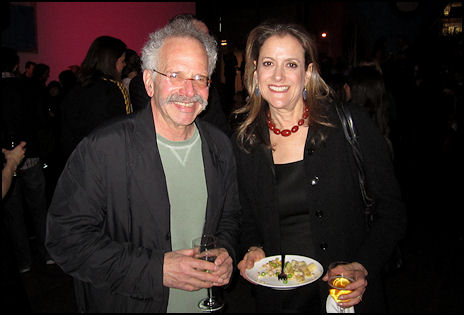
Author/journalist Peter Biskind (Star: How Warren Beatty Seduced America), Film Society of Lincoln Center executive director Mara Manus — Wednesday, 3.24, 9:55 pm.
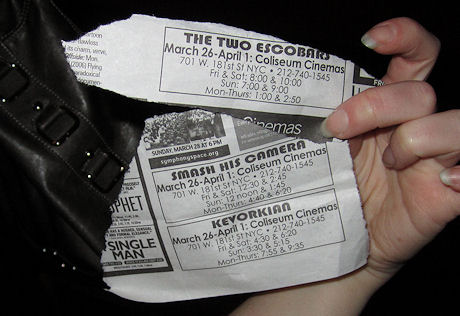
Current under-the-table bookings at the Coliseum on 181st Street.

The main attraction of MOMA’s Tim Burton exhibit.
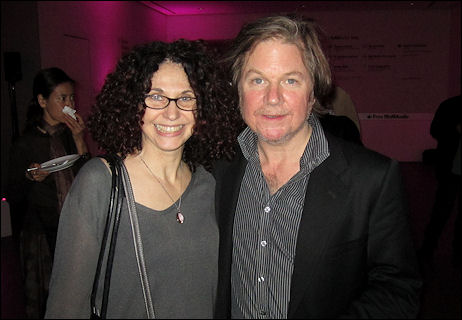
Publicist Donna Dickman; Beautiful Darling director James Rasin. (The doc’s full title is actually Beautiful Darling: The Life and Times of Candy Darling, Andy Warhol Superstar.)

At The Movies Is Dead
In my book A.O. Scott and Michael Phillips were sharp and engaging co-hosts of At The Movies, but the bottom-line Disney-ABC execs didn’t like their ratings so they’re not only whacking Scott-Phillips but pulling the plug on the show. That’s it, finito, all she wrote — the final program will air on Aug. 14th.
I’m sorry. I really liked watching these guys do the At The Movies shpiel. But honestly? I only watched them twice. I was actually trying to find an embed code of their review of Greenberg this morning, but the Disney-ABC webmasters don’t provide them.
Nobody wants to listen to a couple of witty, knowledgable big-city guys riff on the latest films because…well, obviously because film critics are an endangered species coast-to-coast so why should a TV show starring two critics be any kind of success? The internet has given millions of film fans the idea that they know just as much as the smarty-pants types, etc. It’s a new world with new rules.
The producers should have gone with my idea for a film-critic boxing show. Two critics holding opposing views on a new film wouldn’t debate or explain their views — they’d fight it out and bow to the will of God. They’d put on trunks and gloves and go three rounds in the ring, and the one who has the most points (or is still standing) at the end would be presumed to have the wisest and most perceptive view of the film in question. Isn’t this how Spanish land disputes were settled in the days of El Cid?
“This was a very difficult decision, especially considering the program’s rich history and iconic status within the entertainment industry, but from a business perspective it became clear this weekly, half-hour, broadcast syndication series was no longer sustainable,” said Disney-ABC Domestic Television in a statement released late Wednesday afternoon.
These Days
A 3.22 Brent Lang Wrap article uses dog-eared box-office data to remind that Jude Law, Nicole Kidman, Cameron Diaz, Michael Cera, Sean Penn, etc. have starred in several weak earners, and therefore don’t seem to put arses in seats. Even Christian Bale has toplined his share of wipeouts outside the Batman franchise. I think we’ve heard this one before. If the public smells a stinker or a rental or what-have-you, stars mean nothing. It’s the bolt, it’s the buzz — i.e., what the film has in its heart or its head. Stars are tinsel.
Sound Advice
I finally got around to reading that ALL CAPS David Mamet memo to the writers of The Unit, which got cancelled last year. The part that I agree with the most reads as follows:
“QUESTION:WHAT IS DRAMA? DRAMA, AGAIN, IS THE QUEST OF THE HERO TO OVERCOME THOSE THINGS WHICH PREVENT HIM FROM ACHIEVING A SPECIFIC, ACUTE GOAL.
“AND SO WE, THE WRITERS, MUST ASK OURSELVES OF EVERY SCENE THESE THREE QUESTIONS: (1) WHO WANTS WHAT?; (2) WHAT HAPPENS IF THEY DON’T GET IT?; (3) WHY NOW?
“THE ANSWERS TO THESE QUESTIONS ARE LITMUS PAPER. APPLY THEM, AND THEIR ANSWER WILL TELL YOU IF THE SCENE IS DRAMATIC OR NOT.”
Border Finds Home
Oliver Stone‘s South of the Border will be domestically distribbed by Cinema Libre Studio. The doc preemed in September 2009 at the Venice Film Festival, and then showed weeks later at Lincoln Center. It also played last month at the Santa Barbara Film Festival. It’ll be released in New York on 6.25, and will open in nine or ten cities after that. Here’s my admiring review, posted on 9.24.09.
Marquee Leftovers
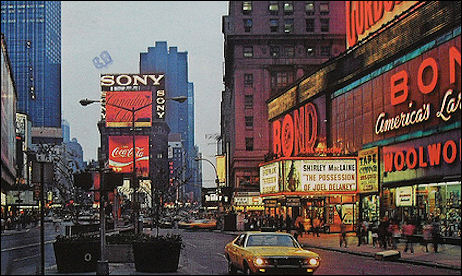
I’ve never seen The Possession of Joel Delaney. Has anyone? The DVD came out two years ago. Did anyone see it in 1972? It’s amazing to think that it played a major house like the Criterion back then, and nobody has even heard of it today.
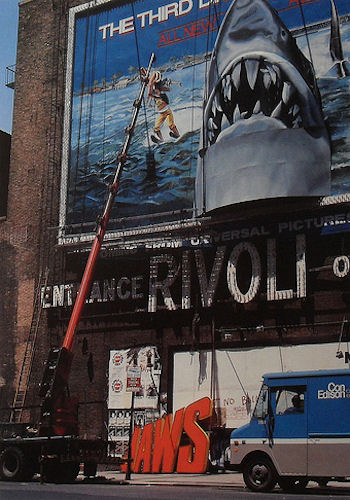
Rear of the Rivoli theatre (Seventh Ave. adjacent) where the abysmal Jaws 3D played in 1983.
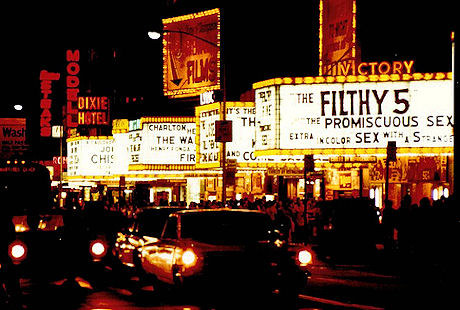
42nd Street in the mid ’60s. I remember the Dixie Hotel. It was a hole. I stepped inside it once as a young lad, and the smell still haunts my nostrils.
Brooks’ Softball Flick
36 hours ago N.Y. Times reporter Michael Cieply posted a what’s-up-with-this? article about James L. Brooks‘ How Do You Know (Columbia, 12.17), a relationship dramedy about a softball player (Reese Witherspoon) involved in a kind-of love triangle with a nice business guy named George (Paul Rudd) and a professional baseball player named Manny (Owen Wilson). Jack Nicholson plays Charles, George’s father.
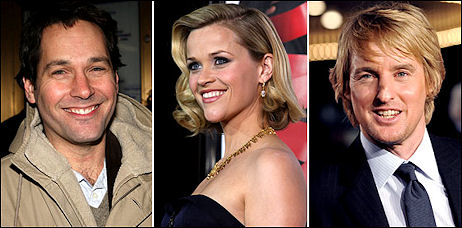
Triptych stolen from New York‘s “Vulture” site.
It’s a little weird for a film to have a title that’s a question (like Quo Vadis?) but spelled without a question mark. Cieply leaves off the question mark, and so does a draft of Brooks’ script that I’ve had on on my desktop since last August. Remember Tom Hanks “there’s no crying in baseball!” line in A League of Their Own? Well, you can’t leave off question marks at the end of a question, movie title or not…kapeesh?
No, I haven’t read the script. Okay, I’ve read 35 pages or so. I didn’t finish out of concern that reading Brooks’ well-honed dialogue might ruin my enjoyment of the finished film. But I can share one thing — Wilson’s Manny has clearly been conceived on the page as a superficially likable but chauvinistic ego-jock in the Tiger Woods vein.
“How Do You Know started…five years ago, when Mr. Brooks…became fixed on the notion of making a film about a young female athlete,” Cieply writes. “Not untypically, he spent hundreds of hours interviewing women who excelled in various sports before settling on softball as good cinematic turf, according to people who worked on How Do You Know and spoke on condition of anonymity to avoid conflict with studio executives and others.
“The plot is rooted in an encounter between two people who meet on the worst night of their respective lives.
“Early on, Mr. Brooks became convinced that only Ms. Witherspoon could play his lead character, Lisa Jorgenson, who, at 27, is just past her sporting prime. Fortunately Ms. Witherspoon shared his conviction: she spent a year doing three-hour daily workouts to prepare for the role.
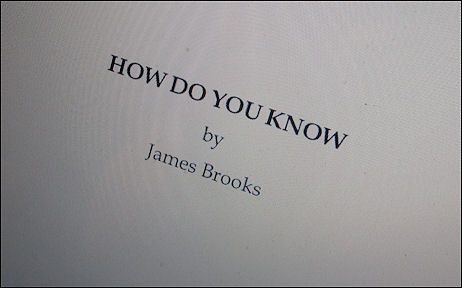

“Along the way Mr. Brooks became fascinated by the dilemmas of contemporary business executives, who are sometimes held accountable by the law for corporate behavior of which they may not even be aware. This brought new research into the lives of people who run companies, work for the Justice Department, or, in at least one case, have spent time in jail.
“From that slowly cooked stew came two new characters, one of whom is now played by Mr. Rudd, the other by Jack Nicholson — a Brooks regular who took the role only after Bill Murray, the first choice, declined.
“To complicate Lisa’s love life, Mr. Brooks created a professional baseball pitcher, now played by Mr. Wilson.
“Mr. Brooks, famously private, disclosed little about the project, which was widely described in news reports as a romantic comedy set in the world of baseball. But the sport only occasionally figures in a film that is actually about people trying to figure out exactly what, for each of them, matters most.
“Mr. Brooks began shooting last summer in Washington and Philadelphia with a team of producers that includes Julie Ansell, who is the president for motion pictures of his Gracie Films; Laurence Mark, who was recently a producer of Julie & Julia and worked with him on As Good as It Gets and other movies; and Paula Weinstein, a film veteran whose credits include Blood Diamond.”

Drive My Car
If Steve McQueen had kept on, he’d be 80 friggin’ years old today.
Curious Move
I don’t know what owesies or side favors are involved, but the Weinstein Co. has just picked up U.S. rights to John Wells‘ The Company Men, a corporate downsizing drama that was generally seen as a dud at Sundance 2010. (Here’s my 1.23.10 review.) It’s not a “bad” or poorly made film per se, but, as I said two months ago, “this drama of layoffs and despondency affecting three Boston-area white-collar guys (Ben Affleck, Tommy Lee Jones, Chris Cooper) plays like an intelligent funeral in a nicely furnished minimum-security prison.”
In All Fairness
In this recently-shot clip, George Bush is shown wiping his hand on the fabric of Bill Clinton‘s right sleeve after shaking the hand of a boogie blackamoor Haitian native. It’s possible — let’s be extra fair — that the guy’s palm may have been sticky or sweaty. You can see Bush’s hand reacting right away to something. But talk about the appearance of being busted. This seems to reveal in a nutshell why Bush didn’t try harder with Katrina relief.
Cameron vs. Beck? Please…Yes!
During an Avatar home-video press session yesterday James Cameron called Glenn Beck “a fucking asshole” and “a madman,” and threw down a challenge to debate the Fox News agitator about global warming and Beck’s “poisonous ideas” in general.
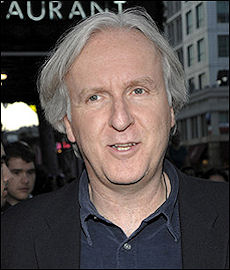
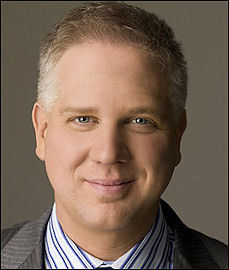
James Cameron, Glenn Beck
Referring to Beck and his regressive brethren, “I want to call those deniers out into the street at high noon and shoot it out with those boneheads.”
Wells to Beck: Be a man and please do this! I’m getting wet just thinking about it. I would pay $20 to see Cameron vs. Beck — seriously.
Beck is “dangerous because his ideas are poisonous,” Cameron said. He described right-wing attacks on him and Avatar‘s pro-earth, anti-corporate stance as “just people ranting away, lost in their little bubbles of reality, steeped in their own hatred, their own fear and hatred.
“That’s where it all comes from. Let’s just call it out. Let’s have a public discussion. That’s what movies are supposed to do, you know. You can have a mindless entertainment film that doesn’t affect anybody [but] I wasn’t interested in that.”
After calling Beck an asshole, Cameron said he’s “met him” and noted that “he called me the anti-Christ and not about Avatar. He hadn’t even seen Avatar [at the time]. I don’t know if he has seen it [since].”
The Hollywood Reporter‘s Alex Ben Block wrote last night that Cameron was apparently referring to Beck’s reaction to “The Lost Tomb of Jesus, Cameron’s 2007 documentary which casts doubt on the resurrection of Jesus Christ and makes the case that the ancient ‘Tomb of the Ten Ossuaries’ belonged to Jesus’ family.”
Cameron later edged away from the “asshole” comment, but reiterated that Beck “certainly is dangerous, and I’d love to have a dialogue with him.”
“I didn’t make this movie with these strong environmental anti-war themes in it to make friends on the right, you know,” Cameron said. “They’re not on my Christmas card list. It’s not going to change my lifestyle at all if they don’t talk to me. But you know they’ve got to live in this world too. And their children do as well, so they’re going to have to be answerable to this at some point.”
